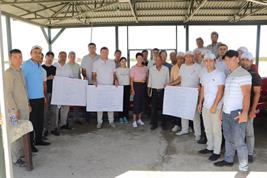06.09.2023

A delegation of the ZALF working group "Impact Assessment of Land Use Changes" (IMA) represented by Katharina Helming, Ahmad Hamidov and Shakhnoza Abulkosimova visited Uzbekistan during 21–25 August 2023. The main aims of the visit were to organize the second WEFCA International Summer School (Sustainability assessment of the water–energy–food–environment nexus for irrigated agriculture: Interdisciplinary approaches for Central Asia) and participate in SusWEF project’s (Sustainable water-saving irrigation technologies to achieve water, energy and food security in the context of climate change in Uzbekistan) field seminar.
The summer school brought together talented early–career scientists conducting research on natural or social sciences in Central Asia to stimulate intraregional research cooperation. The 31 participants from nine different nationalities with interdisciplinary background attended the five-day summer school. During the course, the participants formed five groups with five to six members in each and conducted an ex-ante impact assessment procedure to operationalize the WEF nexus in Central Asia. As follow-up activities, the students were asked to write a short documentation of the group project results, which would be integrated into a potential joint paper about the sustainability impact assessment of WEF nexus in Central Asia. The summer school was organized jointly with ZALF, One CGIAR Centers - IWMI and ICARDA, “TIIAME” NRU, and International Youth Association of Uzbekistan.
On 23 August, the team travelled to Bukhara region to participate in SusWEF field seminar. The project participants visited study site in Peshku district, where the partners demonstrated the experiments regarding the effectiveness of water- and energy-saving irrigation technologies in cotton field. Additionally, the IMA team organized a participatory stakeholder workshop with over 30 participants (represented by farmers, scientists, decision-makers, and water distributors), where the stakeholders discussed the potential impacts of three scenarios/options: (1) Keep business as usual (some adopt the technology and some don't); (2) Intensively adopting modern irrigation technologies (e.g., drip and/or sprinkler); and (3) Not adopting the advanced irrigation technologies at all. At the end, the best option that lead towards more effective and sustainable development, meaning with little/no impact, was agreed by participants.
Further information
